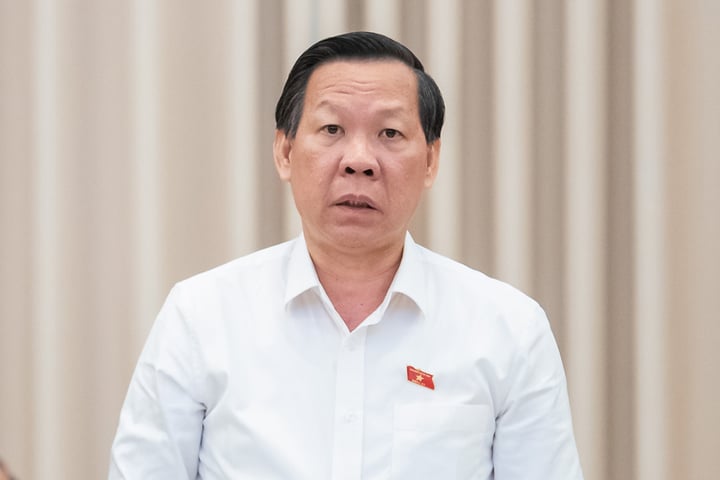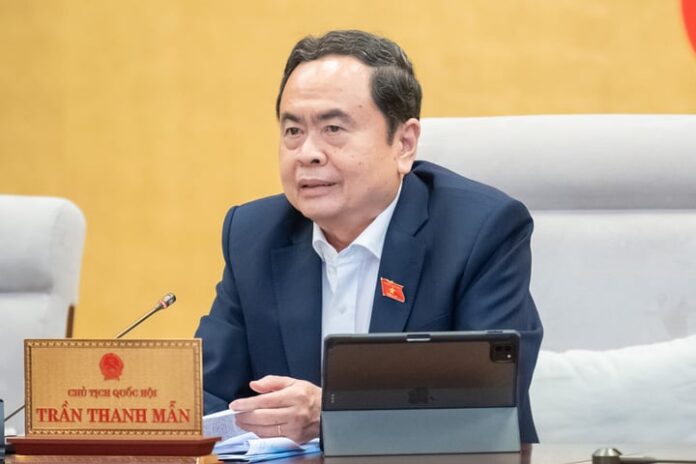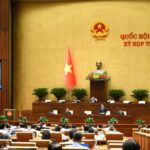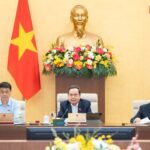National Assembly Chair Tran Thanh Man emphasized the urgency of this matter, stating that while time is limited, the resolution must be “temporarily accepted by the end of this week.” He suggested that a law focusing on private economic development could be enacted in 2026.

National Assembly Chair Tran Thanh Man. (Photo: quochoi.vn)
Chair Man highlighted the goal of having the resolution passed by the National Assembly at 11 a.m. on Saturday, May 17th. He also instructed relevant agencies to pay close attention to the private economic sector when amending and issuing laws during this session, especially those related to the judiciary and taxation.
Additionally, he emphasized the need to shift the mindset from state control to state facilitation and companionship with the private sector on the development journey.
The National Assembly Chair requested that the Government and National Assembly agencies finalize the resolution by the night of May 14th and present it to the Standing Committee of the National Assembly for conclusion and supplementation. It will then be published for comments from National Assembly deputies.
Proposal to Avoid Retroactive Application to the Disadvantage of Enterprises
In the Government’s proposal, Deputy Minister of Finance Nguyen Duc Tam stated that the resolution aims to institutionalize the Party’s guidelines and policies promptly. These guidelines are outlined in Resolution No. 68 and focus on improving the business and investment environment, facilitating the private sector’s access to resources, and promoting science, technology, innovation, digital transformation, and human resource development.

Deputy Minister of Finance Nguyen Duc Tam. (Photo: quochoi.vn)
”
The draft resolution proposes special mechanisms and policies for private economic development, which are within the competence of the National Assembly and differ from the current law provisions or have not been specifically stipulated
,” said Mr. Tam.
The draft resolution comprises seven chapters and 17 articles, institutionalizing five major policy groups. These include improving the business environment, facilitating access to land and production premises, providing financial and credit support, promoting science and technology, innovation, digital transformation, and human resource training, and supporting the formation of medium and large enterprises, as well as pioneering enterprises.
Notably, regarding the handling of violations in business activities, the draft resolution emphasizes distinguishing between the responsibilities of legal entities and individuals, as well as between criminal, administrative, and civil liabilities.
For civil and economic violations, priority will be given to civil and economic measures. Enterprises, business households, and business individuals will be allowed to proactively remedy violations and damages. In cases where the practical application of the law could lead to criminal prosecution or non-prosecution, the non-prosecution option will be chosen.
If the violation reaches a criminal level, proactive, timely, and comprehensive remedial measures for economic consequences will be prioritized. These will serve as important considerations for investigative agencies when deciding on prosecution, investigation, indictment, trial, and subsequent handling measures.
The draft resolution also states that retroactive application of legal provisions to the disadvantage of enterprises, business households, and business individuals is not permitted.
The Government also proposed ensuring the presumption of innocence during the investigation, prosecution, and trial of cases. Additionally, necessary measures should be employed to guarantee the value of assets related to the case and minimize the impact of the investigation on business operations.

Chairman of the National Assembly’s Committee for Economic and Financial Affairs, Phan Van Mai. (Photo: quochoi.vn)
During the review, Mr. Phan Van Mai, Chairman of the National Assembly’s Committee for Economic and Financial Affairs, expressed agreement with the necessity, political basis, and practical basis for constructing and issuing the resolution through an expedited process. He also agreed with the scope of adjustment and the scope of institutionalizing Resolution No. 68 in the draft resolution.
Regarding the principles of inspection and examination, the reviewing agency suggested considering the addition of a provision that, for the same content, state management agencies should not inspect or examine within the same year unless there is clear evidence of a violation. Inspection and examination plans and conclusions must be made public in accordance with the law.
In terms of support for accessing land and production premises in industrial parks, industrial clusters, and technology incubators, Mr. Mai recommended specifying the scale and area allocated for supported enterprises within each industrial park and industrial cluster. This would prevent a “begging” mentality and policy exploitation while facilitating enterprise operations.
Concerning financial and credit support, the Government proposed that enterprises in the private sector, business households, and business individuals would receive a 2% annual interest rate subsidy when borrowing capital for green, circular, and ESG-compliant projects.
To ensure the effectiveness of this policy, the reviewing agency emphasized the need for clear criteria in determining eligible borrowers. It also stressed the importance of adhering to inspection and examination principles and allowing state agencies and commercial banks to make autonomous decisions and take responsibility when implementing the policy.
”
At the same time, it is recommended to specify the form of repayment to investors, ensuring the feasibility of the regulation and corresponding to the form of land rent payment in industrial parks, industrial clusters, and technology incubators, whether it is a one-time payment or an annual payment
,” said Mr. Mai.
The Industry Leaders Take the Hot Seat: Grilling Sessions at the 9th Assembly.
In the upcoming ninth session, members of parliament will be selecting two ministers to question from three key sectors: education and training, finance, and science and technology.
Unlocking the Potential: Unveiling the Vision for Private Sector Growth
“(Chinhphu.vn) – The National Assembly’s Resolution on special mechanisms and policies to promote the private sector is a concise document, marking a new breakthrough in private sector development. The drafting agency has worked diligently to ensure the Resolution’s timely passage by the end of this week.”
Unveiling the State’s Savvy Investments: Minister of Finance Emphasizes Smart State Participation in Enterprises
The role of the state will evolve; instead of managing state-owned enterprises, the state will only manage its capital contributions to these businesses. These contributions are considered assets of the enterprise.





















